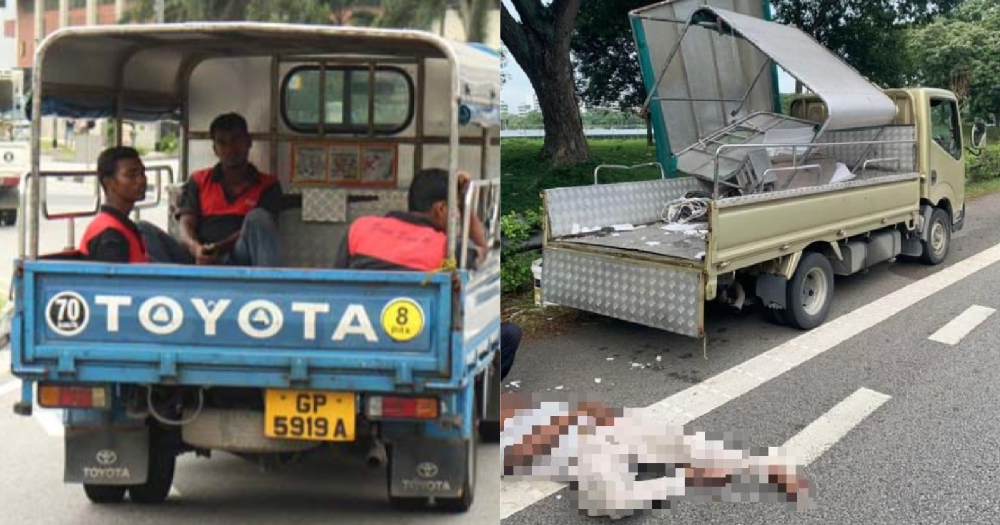A total of 47 migrant worker rights groups and advocates have put out a joint statement on Jul. 24, calling for the Ministry of Transport (MOT) to provide a timeline banning the “unsafe practice” of transporting migrant workers in lorries.
This comes after a "spate" of accidents that left over 30 people injured.
"While we appreciate efforts from the government to improve the safety of workers during transportation, these recent tragic incidents have highlighted the continued grave risks posed by transporting migrant workers on lorries," the statement said.
"Each life lost or major traumatic injury sustained represents a devastating blow to a family and community."
The statement added: "We urgently call upon the Ministry of Transport (MOT) to consider worker safety on roads and provide a timeline to ban this unsafe practice in the future."
Those that backed the call included the Humanitarian Organisation for Migration Economics (HOME), the Covid-19 Migrant Support Coalition, and former Nominated Members of Parliament (NMPs) Anthea Ong and Kok Heng Leun.
37 injured in two days
The joint statement brought up a “recent spate” of accidents that took place between Jul. 18 and 19, where 37 people were reportedly injured.
An accident involving three lorries along Kranji Expressway (KJE) on Jul. 18 morning resulted in 26 men being conveyed to three hospitals.
On Jul. 19, an accident between a car and a lorry on the Kallang-Paya Lebar Expressway (KPE) resulted in 11 people being brought to the hospital, including 10 passengers from the lorry.
These accidents occurred despite updated requirements in the Road Traffic Act (RTA), which came into effect on Jan. 1, 2023.
Under the new requirements of the RTA, newly registered lorries are required to be fitted with rain covers on all non-enclosed sides of the canopy, with at least one side being transparent.
Migrant workers who also double as drivers must also be provided with a half-hour break if they have worked for more than six hours prior to driving.
However, those backing the statement also pointed out that road safety guidelines are provided for securely transporting equipment on lorries, but not for migrant workers.
While the safe loading on vehicles guidelines specify the use of appropriate restraints, tie-downs, to prevent loads from shifting, falling, or posing hazards to other road users, the absence of appropriate seating and safety measures for migrant workers, such as belts, “places their lives in jeopardy”.
In April 2021, two migrant workers died after a lorry carrying 17 passengers was involved in an accident with a stationary tipper truck on the Pan-Island Expressway (PIE).
In October 2022, a five-vehicle collision saw two workers “fly out from the back” of the lorry they were in.
Current measures “inadequate”
The joint statement called current measures “inadequate” to ensure the safety of the workers.
The root cause of the accidents, it was noted, was the "unsafe" practice of transporting workers on the back of lorries.
Citing a 2022 parliamentary reply by transport minister S. Iswaran, the joint statement also said the lorries’ manufacturers have stated that the lorries are not designed to carry passengers, as retrofitting seatbelts on the deck may result in other safety risks.
The statement "urgently" called upon MOT to provide timelines for the banning of transporting migrant workers on lorries, as well as the safe transport of migrant workers on vehicles with seats and belts.
While some companies have swapped out lorries for buses, a complete transition to using buses seems unlikely due to logistical challenges, Senior Minister of State Amy Khor told Parliament in July 2023.
She said "there are insufficient private buses to meet the needs across various sectors" and that a "full transition to transportation via buses" would require at least a doubling of the number of large private buses today.
"This will have knock-on effects on the rest of society, including more congestion."
Related Stories:
Top photos from TWC2's ItsRainingRaincoats video and Shin Min Daily News
If you like what you read, follow us on Facebook, Instagram, Twitter and Telegram to get the latest updates.



